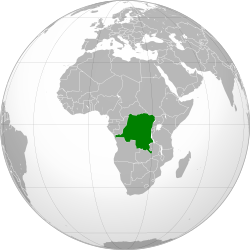
Back Zaïre Afrikaans زائير Arabic Zaire AST Zair Azerbaijani Рэспубліка Заір Byelorussian Заир Bulgarian জায়ার Bengali/Bangla Zair Breton Zaire Catalan زەئیر CKB
Republic of Zaire République du Zaïre (French) Repubilika ya Zaïre (Kituba) Republíki ya Zaïre (Lingala) Jamhuri ya Zaïre (Swahili) Ditunga dia Zaïre (Luba-Lulua) | |||||||||
|---|---|---|---|---|---|---|---|---|---|
| 1971–1997 | |||||||||
| Motto: Paix — Justice — Travail[1] "Peace — Justice — Work" | |||||||||
| Anthem: La Zaïroise "The Song of Zaire" | |||||||||
 | |||||||||
| Capital and largest city | Kinshasa 4°19′S 15°19′E / 4.317°S 15.317°E | ||||||||
| Official languages | French | ||||||||
| Recognised national languages | |||||||||
| Ethnic groups | See Ethnic groups section below | ||||||||
| Religion (1986)[2] |
| ||||||||
| Demonym(s) | Zairian | ||||||||
| Government | Unitary Mobutist one-party[b] presidential republic under a totalitarian military dictatorship | ||||||||
| President | |||||||||
• 1965–1997 | Mobutu Sese Seko | ||||||||
| Prime Minister | |||||||||
• 1977–1979 (first) | Mpinga Kasenda | ||||||||
• 1997 (last) | Likulia Bolongo | ||||||||
| Legislature | Legislative Council | ||||||||
| Historical era | Cold War | ||||||||
| 24 November 1965 | |||||||||
• Established | 27 October 1971 | ||||||||
| 15 August 1974 | |||||||||
| 18 May 1997 | |||||||||
• Death of Mobutu | 7 September 1997 | ||||||||
| Area | |||||||||
• Total | 2,345,409 km2 (905,567 sq mi) | ||||||||
• Water (%) | 3.32 | ||||||||
| Population | |||||||||
• 1971 | 18,400,000[5] | ||||||||
• 1997 | 46,498,539 | ||||||||
| GDP (nominal) | 1983 estimate | ||||||||
• Total | |||||||||
| HDI (1990 formula) | 0.294[6] low | ||||||||
| Currency | Zaïre (ZRN) | ||||||||
| Time zone | UTC+1 to +2 (WAT and CAT) | ||||||||
| Driving side | right | ||||||||
| Calling code | +243 | ||||||||
| ISO 3166 code | ZR | ||||||||
| Internet TLD | .zr | ||||||||
| |||||||||
| Today part of | Democratic Republic of the Congo | ||||||||
| History of the Democratic Republic of the Congo | ||||||||||||||||
|---|---|---|---|---|---|---|---|---|---|---|---|---|---|---|---|---|
 | ||||||||||||||||
|
||||||||||||||||
|
||||||||||||||||
|
||||||||||||||||
| See also: Years | ||||||||||||||||
|
| ||||||||||||||||
Zaire,[c] officially the Republic of Zaire,[d] was the name of the Democratic Republic of the Congo from 1971 to 1997. Zaire was located in Central Africa and was, by area, the third-largest country in Africa (after Sudan and Algeria), and the 11th-largest country (from 1965 to 1997) in the world. With a population of over 23 million inhabitants, Zaire was the most populous officially Francophone country in Africa, as well as one of the most populous in Africa.
The country was a one-party totalitarian military dictatorship, run by Mobutu Sese Seko and his ruling Popular Movement of the Revolution party. Zaire was established following Mobutu's seizure of power in a military coup in 1965, after five years of political upheaval following independence from Belgium known as the Congo Crisis. Zaire had a strongly centralist constitution, and foreign assets were nationalized. The period is sometimes referred to as the Second Congolese Republic.
A wider campaign of Authenticité, ridding the country of the influences from the colonial era of the Belgian Congo, was also launched under Mobutu's direction. Weakened by the termination of American support after the end of the Cold War, Mobutu was forced to declare a new republic in 1990 to cope with demands for change. By the time of its downfall, Zaire was characterised by widespread cronyism, corruption and economic mismanagement.
Zaire collapsed in the late 1990s, amid the destabilization of the eastern parts of the country in the aftermath of the Rwandan genocide and growing ethnic violence. In 1996, Laurent-Désiré Kabila, the head of the Alliance of Democratic Forces for the Liberation of Congo (AFDL) militia, led a popular rebellion against Mobutu. With rebel forces making gains westward, Mobutu fled the country, leaving Kabila's forces in charge as the country restored its name to the Democratic Republic of the Congo the following year. Mobutu died less than four months later while in exile in Morocco.
- ^ Constitution de la République du Zaïre, article 5: "Sa devise est : Paix — Justice — Travail" Source: Journal Officiel de la République du Zaïre (N. 1 du 1er janvier 1983)
- ^ a b The World Factbook 1986 (PDF). Springfield, Virginia: Central Intelligence Agency. 1986. p. 271. Archived (PDF) from the original on 13 April 2021.
- ^ Kaplan, Irving (ed.) Zaire: A Country Study Third Edition, First Printing 1979
- ^ Sandra W. Meditz and Tim Merrill (eds.) Zaire: A Country Study Fourth Edition 1993
- ^ Services, United States Dept of State Office of Media (15 July 1975). Countries of the World and Their Leaders: The U.S. Department of State's Report on Status of the World's Nations, Combined with Its Series of Background Notes Portraying Contemporary Political and Economic Conditions, Governmental Policies and Personnel, Political Parties, Religion, History, Education, Press, Radio and TV, and Other Characteristics of Each Nation: Includes Central Intelligence Agency's List of Chiefs of State and Cabinet Members of Foreign Governments. Gale Research Company. ISBN 9780810310469 – via Google Books.
- ^ "Human Development Report 1990" (PDF). New York: Oxford University Press. 1990. Archived (PDF) from the original on 2 February 2014. Retrieved 23 July 2021.
Cite error: There are <ref group=lower-alpha> tags or {{efn}} templates on this page, but the references will not show without a {{reflist|group=lower-alpha}} template or {{notelist}} template (see the help page).

